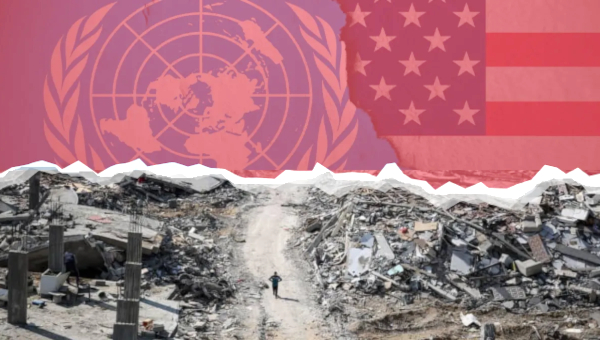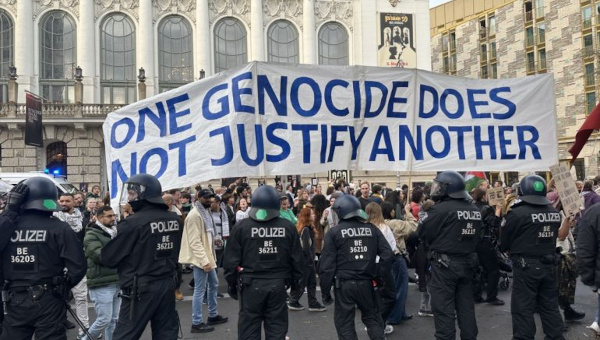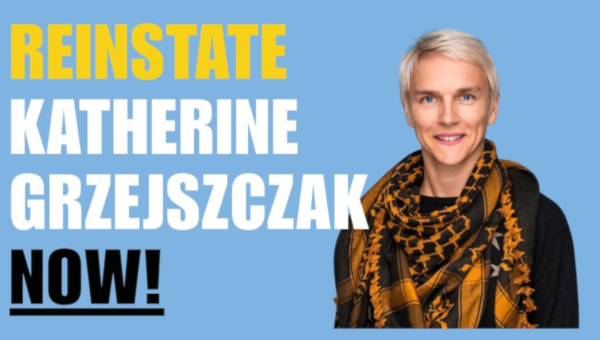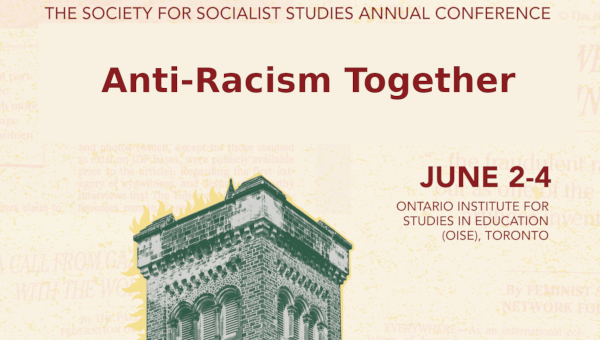Remaking the Politics of Palestine Solidarity in Canada
A little over a year ago, Arab YouTube celebrity Nas Daily held a talk at McGill University in Montreal, hosted by the McGill Arab Student Network. The event page on Facebook quickly drew controversy, as Palestinian students from various Canadian campuses descended into a protracted back-and-forth with the event organizers. Commentators highlighted Nas’s role in whitewashing Israel’s crimes against the Palestinians. For a Palestinian social media celebrity who enjoys exposure to 10 million followers, Nas presents a dangerously narrow view of the conflict that minimizes Israel’s responsibility. It was thus of little surprise that Palestinian human rights clubs at McGill and Concordia University (also in Montreal) scrambled to release statements of condemnation. Still, in the end, the event was held to a packed audience.
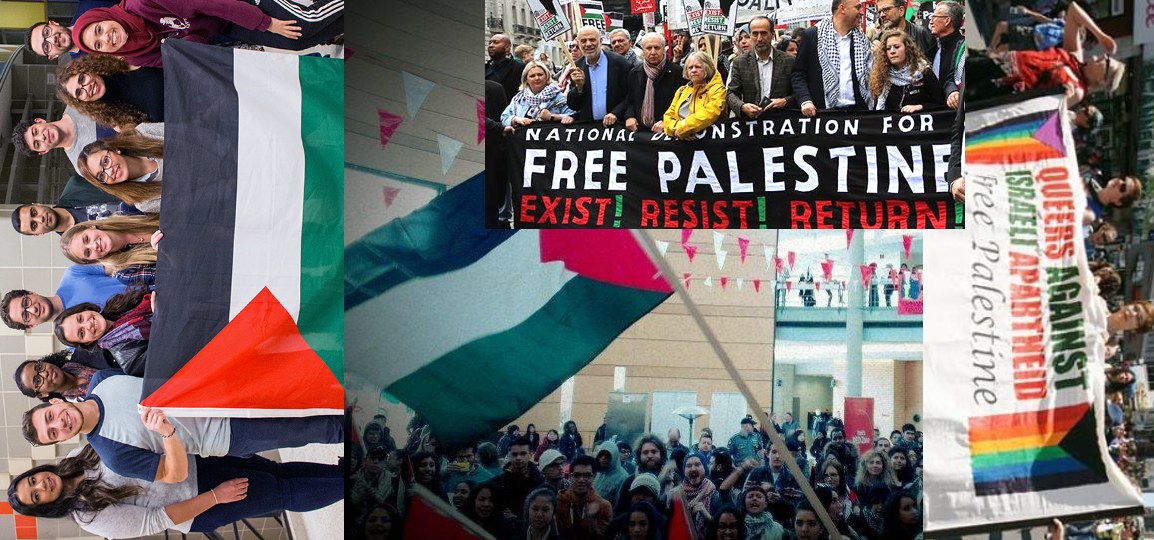
This episode was emblematic of the growing trend in the Canadian-Arab community to engage in cultural and professional event programming to the exclusion of politics and education. Just as Nas tries to avoid the unavoidable by turning the deeply unequal political relationship between Israel and the Palestinians into a cultural misunderstanding between Jews and Arabs, Arab associations in Canada, both existing and newly emerging across the neoliberal landscape, find themselves in the awkward position of having to make being resolutely non-political a point of pride. Inevitably, this means avoiding those engaged in political organizing out of fear of the shame that follows such interactions.
The Erasure of Politics
This curbing of politics has enormous consequences for the Palestinian diaspora in Canada. We are witnessing an attempt to redefine our Palestinian identity – from one based on our collective project of political emancipation and resistance that began with the pre-1948 revolt against the British Mandate and developed throughout the post-Nakba Palestinian revolution, to an identity that sees our national symbols like the kuffiyeh or the olive tree denuded of their historical and political meaning. Our culture of exile and resistance in daily life is being ‘made safe’ for the social integration of our elite’s ongoing integration into Canada’s ruling classes, while the exploitation and oppression suffered by the majority among us – here in Canada and in Palestine – deepens.
An online search of local Arab community events in Canada turns up an endless array of galas, seasonal mixers, networking events, professional-development conferences, more networking events, youth connects, and entrepreneurial- and personal-branding workshops. These copycat events are hosted by not only one, but by numerous competing Arab associations and ‘professional associations’. Any ‘political’ programming involves Arab youth meeting representatives from each of the three major Canadian political parties, as if they were being presented with career options or consumer goods rather than opportunities for meaningful political engagement.
Similarly, on university campuses, several attempts have been made in recent years, both successful and unsuccessful, to form Palestinian student associations that prioritize narrow identity-related concerns and entertainment through food and dance. In one such case, a Palestinian student association replaced a chapter of Students Against Israeli Apartheid, and initially kept overtly political events at arm’s length in its programming.
This was simply not the case a decade ago. Arab students displayed an acute awareness about the role of American and Israeli foreign policy, of capitalism and imperialism, in shaping their lives. They prided themselves on their understanding that injustice in the Middle East is tied to injustice everywhere. These prior generations of Arab students had a sense – grounded in an internationalist framework – of the need to organize against injustice by building solidarity.
To be clear, we know that promoting cultural expression is imperative in the struggle to defend ourselves against attempts to wipe us from the historical record. However, during my time as a student at York University and an activist in the anti-war movement, Palestinian identity was defined by cultural symbols imbued with meaning derived from a socialist political framework focused on building solidarity in the struggle against war, imperialism, and capitalism – the championing of a better world for all. The same cannot be said for the experiences and worldviews of many Palestinian students today.
The phenomenon of political erasure is by no means limited to the Arab community. It corresponds to the integration of the professional middle and upper classes of immigrant communities into the ruling (small ‘l’) liberal elite that is central to the Canadian identity and the liberal democratic state.
While Canadian multiculturalism has largely succeeded in integrating a narrow layer of the ruling political and economic classes in immigrant communities to act as power brokers (often of even an old clientalist kind), inequality within these communities, and within Canadian society more generally, has continued to grow apace. And as inequality grows, the interests of these elites move further away from the interests of the working-class members of these communities. The result is that there is now a pronounced convergence between the interests of elites in immigrant communities and the interests of those of long-standing within the Canadian ruling classes. At the same time, there is a pronounced divergence between these interests and the interests of the majority of people in their own communities.
For example, Omar Alghabra, a well-known Arab politician in the Liberal Party has more in common with the narrowing segment of upwardly mobile middle class and wealthy Canadians in the Greater Toronto Area than he does with poor and working-class Arabs here. It doesn’t matter that Alghabra comes from a humble background. The point is that now that his interests are aligned with the political elite in the Liberal Party, he can no longer afford to stand up in the same ways for those in his community who are struggling to make ends meet. Community elites will tend to refuse to support causes or policies that may pose a threat to their own interests or those of their friends and colleagues – whether supporting the unionization of workers that they employ, or supporting Palestinian human rights through political actions that disrupt economic transactions. The focus on cultural expression without political expression fits the needs of upwardly mobile elites, but not the poor and working-class people that are the backbone of the Palestinian diaspora community.
The withdrawal of many Palestinians in Canada from political activism, and the retreat into the world of professional politics, managerialism, NGOs, and cultural expression, inevitably has the effect of weakening the bonds of solidarity that have proven crucial to rendering the oppression of Palestinians as increasingly visible to mainstream audiences. If our community elites succeed in peddling representation and entrepreneurship as realistic substitutes for political organizing, it risks hitting the solidarity movement’s greatest strength – its existence as a forum where Palestinians and non-Palestinians work together toward a struggle fundamental to our common liberation.
BDS and Solidarity with Palestine
The failure of community elites to not only advance the national struggle, but also to improve the conditions of Palestinians in Canada, means that the task moving forward must be to organize a political alternative based on the interests of the majority. That can only be done once the organization of workers here is acknowledged as a condition for meaningful solidarity work. Activists in the BDS (boycott, divestment, and sanctions) movement should be commended on their success in contributing to the sea change in the discourse surrounding Palestinians over the last decade. Great strides have been made in the realm of public opinion in Canada, particularly in the union and social movements, and amongst many First Nations communities. But the reality is that activity confined to the student movement, and conducted by professionals in the NGO sector, is vulnerable to institutional pressure and careerism.
These limits partly explain why the BDS movement has yet to convert its discursive victories into substantive ones, and currently lacks the muscle to compel a real, material change in state policy toward Israel.
Initiating the next phase of the Palestine solidarity movement will require going beyond BDS resolutions – which have been passed by many major organizations, including unions, to great fanfare, only to be left languishing, packed, and hidden away for lack of power to enforce them. Only by working closely with organizers and rank-and-file activists in the labour movement in Canada, as our predecessors in the movement against apartheid in South Africa did, will we be able to build enough power to promote meaningful international solidarity. Such power is necessary to make political elites, both in the Palestinian community and Canadian society at large, act in our interests and halt the drift toward anti-solidaristic attitudes and de-politicized cultural expression. •


